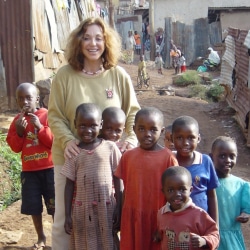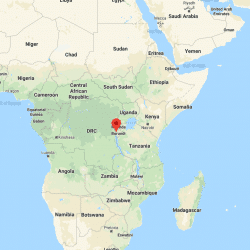
FXB in Burundi by Albina du Boisrouvray
FXB in Burundi
The mission of FXB, which I founded in 1989 (and which bears the initials of my late son François-Xavier Bagnoud), is to find innovative solutions to defend and remedy the forgotten causes of people in forgotten places.
In 1991, reality showed us that fragmented aid is not a sufficient solution to break the vicious circle of extreme poverty, hence our global and holistic approach.
In Uganda and as early as 1991, we also found that in situations of extreme poverty, providing only a working tool, called an “income-generating activity”, by means of microcredit alone, did not lift the people concerned out of extreme poverty.
So what could be more natural than to also invest in a small business in the local economy, surrounding it with access to the basic rights of housing, food, health care, education, drinking water, as FXB did for all its other programs. Putting Harvard’s Dr. Jonathan Mann’s public health paradigm into action, i.e. the link between Health and Human Rights.
With the immediate addition of a working tool in 1991, a development paradigm emerged which in three years enabled the 80 families in the programme concerned to move from absolute poverty to social and economic independence, to protect their children and provide them with a future. An integrated response that addresses the multi-dimensional causes of this extreme poverty.
FXB has helped 18 million people since 1991
We have been, since 1991, the preliminary and preparatory stage for microcredit.
Since that time and with the VillageFXB program, we have taken 85,000 people out of extreme poverty and for nearly thirty years, through all the FXB Foundation and Association programs combined, the lives of 18 million people have been impacted in one way or another.
In Burundi, we started working with FXB Villages in the capital city of Bujumbura where we met the most forgotten and marginalized communities: the Pygmies.
By Pygmy, we mean this people of small height, gatherers and hunters, scattered throughout the equatorial forests of Central Africa. In Bantu language, they are called Batwa.
A poverty-stricken and destitute community in Burundi, forgotten on all levels: 1% of the total population, whereas Tutsis and Hutus account for 14% and 85% of the population respectively.
Despite government legislation, they continue to live under stigma and discrimination, and their social inferiority is a profound attack against their dignity.
90% of Burundians live from agriculture and animal farming. The problem is that the Batwa consider their right to land as collective! But in Burundi this right is not recognized. And land is scarce, with 437 inhabitants per square kilometre!
To top it all off, the land laws in force, dating from the colonial era, base the protection of customary rights on the visible occupation of these lands. The hunter-gatherer peoples leave very few visible signs, which gives the appearance that these lands are unoccupied, which are described as vacant and therefore devoted to public use or ceded to private individuals.
Batwas are marginalized by other ethnicities
These Batwa, considered as dirty animals, have to settle in seclusion, at the edge of the forests or in the valleys. They make their living from pottery in rural areas. But this trade, like that of forging or weaving mats, is no longer relevant. Some, they say, continue to make pottery so as not to forget a traditional craft. But most of them started working as labourers in the fields of well-to-do peasants, for a little food or a meager salary, a working situation similar to that of Syrian refugees in Lebanese rural camps today.
This inadequate remuneration is another form of exploitation of the Batwa of Burundi by other ethnic groups.
The fact that they are not treated equally is visible during celebrations such as weddings. This celebration involves sharing food and drink. The Batwa eat separately and drink separately, as the other ethnic groups do not allow them to get too close to them or to touch cooking utensils or cutlery.
Mixed marriages are unimaginable…
Very recently, thing have started to change.
Indigenous Batwa organizations have been actively organizing themselves for the respect of the rights of indigenous peoples, the respect of their territories and the search for models of development and conservation. From this was born “Uniproba” (Unite for the promotion of the Batwa) and the concession of three seats in Parliament and three in the Senate with the hope one day of being part of the country’s management commissions. This is a small but encouraging step forward.
In Buterere, in the suburbs of Bujumbura in Burundi where we have set up FXBVillages, there is a site called Nyarumanga, 90% of which is inhabited by the Batwa community.
These people with no source of income are reduced to collecting food and garbage from the Buterere garbage dump.
Among the 400 households on this site, about 20 Batwa families have been chosen by FXB to help them get by.
Dorothée is one of them.
She told us her story in tears.
This family fully met the eligibility criteria.
And from a daily life of survival on a mountain of garbage, Dorothée had access to an income-generating activity. She created a small business that meets the needs of the local economy, in which she is now involved, which she is developing with ambition and which allows her to replace FXB, after three years, to provide her children with food, housing, health, education and savings, the five factors whose absence maintains the cycle of extreme poverty.
Albina du Boisrouvray
